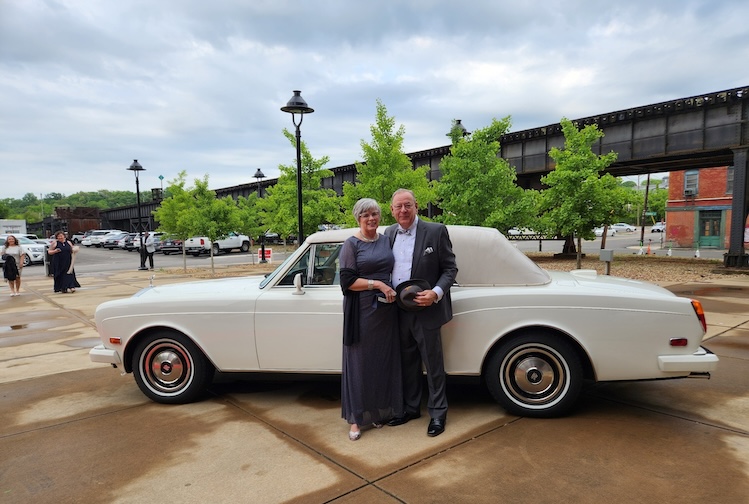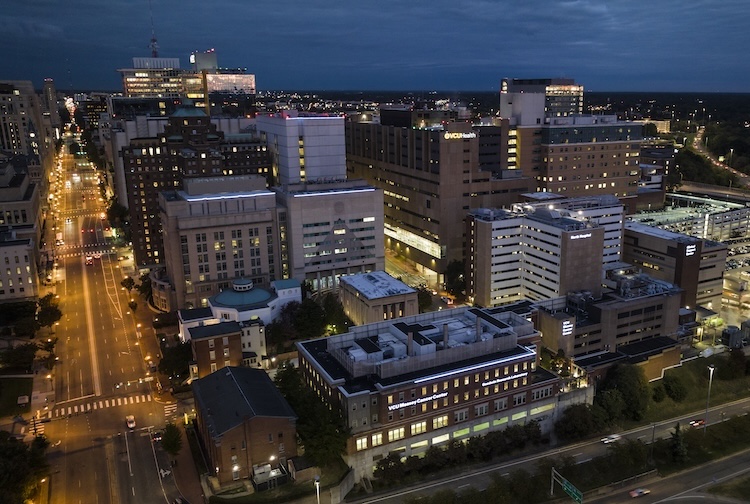From heart transplant to heartfelt mission
After a transplant, Denis Popp finds a new calling to support others living with serious heart conditions.
February 12, 2025 Denis Popp attended the American Heart Association Heart Walk with his family. (Contributed Photo)
Denis Popp attended the American Heart Association Heart Walk with his family. (Contributed Photo)
By Jeff Kelley
After meeting Denis Popp, you’d be forgiven if you came away thinking he’s thankful that he had a heart attack.
For nearly a decade, the 68-year-old heart transplant recipient has been a familiar face with Virginia patients who are facing a transplant or procedures that will offer mechanical cardiac support. He even serves as an “ambassador” for organ transplant groups LifeNet Health and the United Network for Organ Sharing (UNOS), and volunteers for the American Heart Association along with Mended Hearts, a nonprofit that provides peer-to-peer counseling for those living with cardiac diseases.
Popp estimates he has met with more than 2,000 people with serious heart conditions from all walks of life.
“This is my calling. Why do I do this? Because of the love I've received. I am the recipient of another family’s love and their loss,” said Popp, who received a new heart in early 2017. “Someone passed away to give me this heart. I don’t know my donor. I don’t have to know my donor to know that they, and any organ donor, will give the greatest gift they can ever give.”

Denis Popp and his wife, Pat, celebrating at The Heart Ball hosted by the American Heart Association. (Contributed Photo)
Popp has faced health challenges since the turn of the century, starting with a transient ischemic attack (TIA) — similar to a stroke, but without the long-term damage. Then in 2004, he mistook shoulder pain for a muscle injury, but when a relaxant didn't work, he visited an urgent care clinic and was told he was having a heart attack. He received three stents to clear blockages in his arteries.
The years that followed included an implantable cardioverter defibrillator (ICD) to monitor and regulate heart rhythm, and in 2013, he spent five days in a coma after going into cardiac arrest from congestive heart failure. A 2015 aortic valve replacement procedure failed to improve the function of his left ventricle, a critical chamber of the heart that pumps oxygen-rich blood through the body. Three emergency room visits later, he was told by his physician that there was nothing more his community hospital could do.
Popp was taken to VCU Health — and there was, indeed, something they could do.
How the LVAD is a bridge to transplant and a destination therapy for patients
Popp was told he’d need a heart transplant to survive long-term. But his left ventricle required help immediately. The Mechanicsville husband and father of four daughters was a candidate for “mechanical support” in the form of a left ventricular assistance device, also known as an LVAD or VAD for short.
An LVAD is a surgically implanted mechanical pump that helps the heart’s left ventricle pump blood. LVADs have evolved significantly over the years, providing patients with greater mobility and longer survival rates.
This is my calling. Why do I do this? Because of the love I've received. I am the recipient of another family’s love and their loss.
Denis Popp, heart transplant recipient and volunteer
While the device is life-sustaining, wearing one requires major adjustments to daily living, including battery maintenance, lifestyle modifications, and frequent medical follow-ups. The LVAD’s external power source is held on with a suspenders-like vest and must be kept dry. That means no swimming and a bag is required for the shower. Wearers must be vigilant about infection prevention and maintenance of the device, which continuously monitors and controls the LVAD — and therefore, the human heart’s — function. It hums, which patients say can be annoying. It can be uncomfortable.
But it keeps its wearer alive.
For some patients with severe heart failure who do not qualify for a transplant due to age or underlying conditions, the LVAD is a destination therapy and will improve the person’s quality of life until the end of it.
For others, like an otherwise healthy Popp, the LVAD serves as a “bridge” to a heart transplant for the time when a heart, hopefully, becomes available. A nationwide 2018 change in organ allocation policies by the United Network for Organ Sharing influenced the timing of heart transplants for LVAD patients based on medical urgency.
“VAD patients awaiting transplant typically do very well — they’re able to rehabilitate, which is a very positive thing, as they can get back to their lives,” said Kathryn Abernathy, VCU Health’s manager of transplant services, who works with both Pauley Heart Center and Hume-Lee Transplant Center with patients who have heart failure, heart transplant, and LVAD.
What to know about left ventricular assist devices (LVADs)
Every patient’s journey with advanced heart failure is unique, and not everyone is a candidate for LVAD or transplant, Abernathy notes. Medical factors, anatomical considerations and social support systems play a role in determining eligibility.
“Each case is thoroughly evaluated to determine the safest and most effective treatment plan,” she said.
For those approved for LVAD as a bridge to transplant, understanding the options, risks, and lifestyle adjustments is important. Despite the challenges of wearing the LVAD, “we focus on what the patient’s goals are — whether it’s attending a family wedding or continuing to work—and help them understand how an LVAD can support those goals,” Abernathy said.
At the time of his transplant, Abernathy was VCU Health’s LVAD coordinator and was close to Popp, who calls her “Saint Kathryn.” Popp had his LVAD for more than 440 days before his January 4, 2017, transplant.
“LVAD was a very difficult thing to do. It's a different lifestyle,” he said, “but it kept me alive.”
Crossing the bridge to a new heart
Ultimately, Popp’s LVAD was the step to his new life as a heart transplant recipient and his calling. Whether sitting with a patient who has just received life-changing surgery or speaking with donor families, Abernathy says Popp’s impact on others is far reaching across VCU Health.
“[His] willingness to share his experience has been invaluable – not only to patients, but also to medical professionals who gain insight into the real-life challenges and triumphs,” she said.
Transplant recipients encounter various emotions even following the elation of receiving a new organ. This can include a mix of gratitude and the weight of survival, accompanied by reflection on the challenges their loved ones endured throughout the journey.
.jpg)
Denis Popp with his wife, Pat, attending the 2024 Celebration of Life Gala hosted by LifeNet Health. (Contributed Photo)
For Popp, those feelings were especially poignant when he thought about his daughters, particularly his youngest. She is terrified of hospitals, but Popp said she managed to visit him at VCU Medical Center during his recovery, with a plush heart character that he keeps to this day.
“She walked into my room, she held that heart and she said, ‘Daddy, I love you.’ I still see her eyes,” he said. “I still hear those three words, and that peace I still have with me.”
He shares that peace with others, driven by his love for connecting and offering support – paying it forward in the way he knows best.
“I’m very blessed that I’ve been given a gift, and how do you make something that hurts better? You talk about it,” he said. “I love and am at peace with who I am at this stage of my life. Why do I go on? Because it is really joyful to have somebody smiling.”
As it does for all those who undergo a transplant, the experience has changed Popp’s outlook on life. While he wishes no one would ever have to experience a heart attack, especially at a young age, he hopes his story can show others that there is a way forward.
“I still remember very, very strongly my emotions as I went through this,” Popp said. “No, it's not easy, but you have a choice. You can suffer through things or live through things.”
Inspired by this story? Read more about our patients and provider
At VCU Health Pauley Heart Center, our world-class team takes your heart health personally




